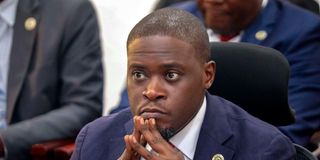Premium
Finance Bill withdrawals: From Ruto to Mutula and now Sakaja…

Nairobi Governor Johnson Sakaja when he appeared before the Senate Committee on County Public Accounts on May 6, 2024.
What you need to know:
- Last week, President William Ruto announced the withdrawal of the Finance Bill, 2024.
- Governor Sakaja said he is keen on creating value for the lives of Nairobi residents.
Nairobi Governor Johnson Sakaja has shelved plans on new levies and charges, citing the need to listen to the people.
His decision comes after Makueni’s Mutula Kilonzo announced the withdrawal of the county’s Finance Bill, 2024, to avert street demonstrations by locals.
Last week, President William Ruto announced the withdrawal of the Finance Bill, 2024 after deadly protests around the country.
While making the announcement on Thursday, Governor Sakaja said the city county government would rely on charges and levies contained in the Finance Bill, 2023 until the next financial year.
“The Finance Bill, 2023 is still in use. We will not introduce another bill until next year. We want to listen to the people and how they are responding to the charges we introduced before we come up with a new bill,” Mr Sakaja said.
The withdrawal of the finance bills means the devolved and national governments must enforce austerity measures and increase revenue mobilisation to meet targets.
The Nairobi City County government has approved a budget of Sh43.5 billion, targeting to collect Sh20 billion in the 2024/25 financial year.
The devolved government recorded Sh12.8 billion in own revenue against a target of Sh19 billion in the current financial year.
Making reference on a decision by his administration to retain the current levies and charges, Governor Sakaja said he is keen on implementing austerity and creating value for the lives of Nairobi residents.
“We are not saying that Nairobians do not want to pay taxes. The issue is the prudent use of taxpayers’ resources,” Mr Sakaja said.
“As a devolved government, we are working hard to improve the lives of Nairobi residents. That is what we will continue doing. We are never been extravagant, even in hospitality. Our foreign travel budgets have gone down except for important ones such as the trip I made to the United States.”
The county government is planning to regularise development and tap on the Sectional Properties Act to collect more revenue.
Mr Kilonzo said a decision to withdraw the bill followed reports of planned protests.
“We sat as a Cabinet and decided not to implement our new tax proposals after businesses said they could not afford them, citing tough economic times,” he said.
"We sat as a Cabinet and decided not to implement our new tax proposals this year after traders said they could not afford them, citing tough economic times. We will revisit the proposals in the next financial year when the economy improves," Mr Kilonzo said on Monday.
The moves by the leaders however come after a series of protests against the national finance bill 2024.
The protests led by the youth led to the death of 41 people, injuries of hundreds and destruction of property worth millions of shillings.
President Ruto, while explaining his decision not to sign the bill, said the government will now focus on the implementation of austerity measures and the implementation of critical services to residents.
"I direct immediate further austerity measures to reduce expenditure, starting with the Executive Office of the President and extending to the entire executive arm of government," President Ruto said.
"I direct that operational expenditure in the Presidency be reduced to remove allocations for the confidential vote, reduce travel budget, hospitality and purchase of motor vehicles, renovations and other expenditures," the Head of State further said.





